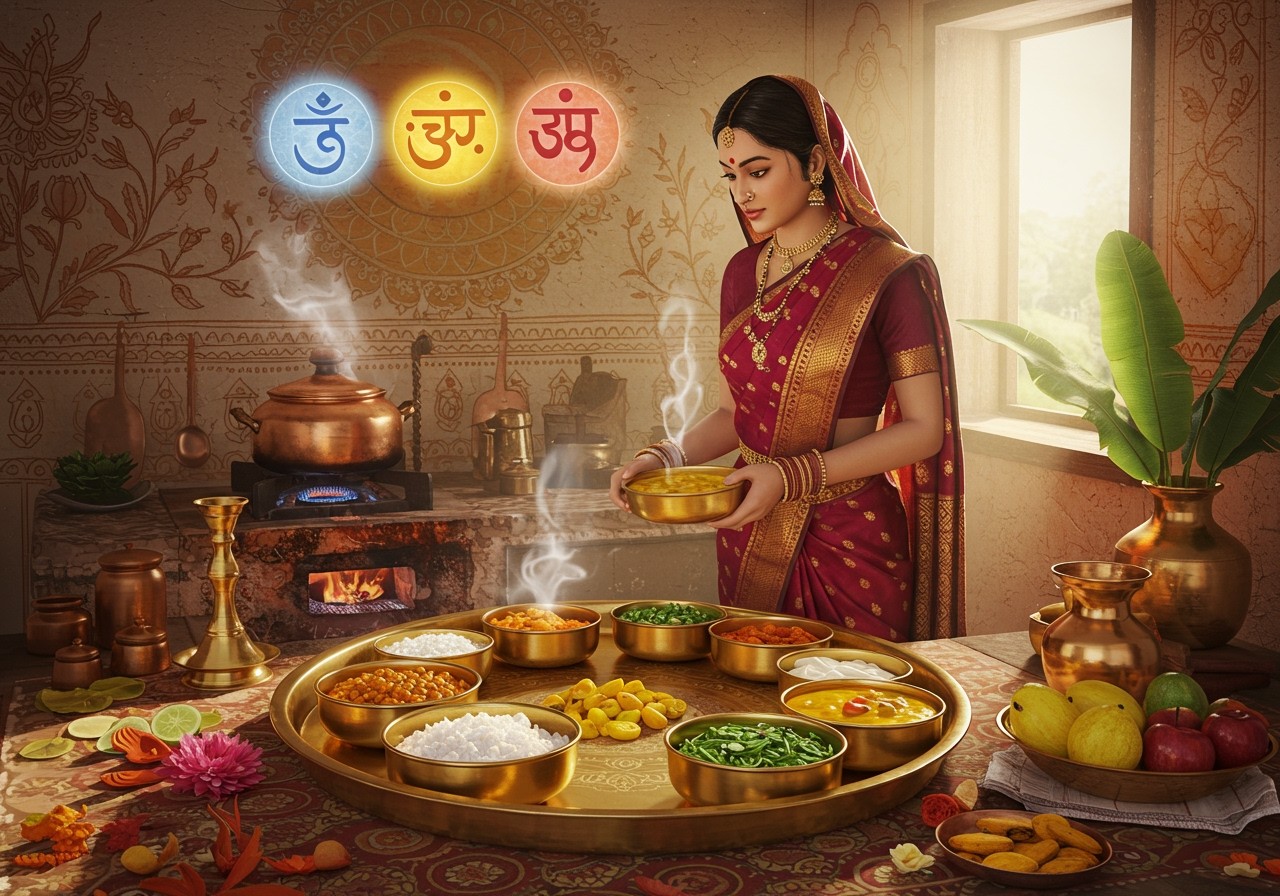
India’s culinary heritage is deeply intertwined with spirituality, and nowhere is this more evident than in Hindu food ethics. These traditions go beyond mere sustenance, representing a profound connection between our physical and spiritual selves. They offer a fascinating glimpse into how faith shapes daily life, influencing choices from everyday meals to elaborate rituals. Let’s explore this intricate relationship, understanding how food becomes a pathway to spiritual growth and cultural expression.
Ahimsa: The Cornerstone of Hindu Dietary Practices
Ahimsa, the principle of non-violence, forms the bedrock of Hindu ethics, extending its compassionate embrace to all living beings. This reverence for life often translates into a preference for vegetarianism, minimizing harm to animals. This resonates with the concept of living in harmony with nature, a key aspect of Hindu philosophy.
- Ahimsa in Action: Many Hindus adopt a lacto-vegetarian diet, which includes dairy but excludes meat, eggs, and fish. This dietary choice reflects the deep respect for life inherent in the principle of Ahimsa.
- Beyond Vegetarianism: Even non-vegetarian Hindus often adhere to specific dietary restrictions, abstaining from certain meats like beef due to the cow’s sacred status in Hinduism. According to a 2021 Pew Research Center study, a significant majority of Hindus believe consuming beef is incompatible with Hindu identity.
To support your sattvic journey, explore our range of pure copper and brass utensils at Poojn.in. These traditional vessels not only enhance the purity of your food and water but also add a touch of sacredness to your kitchen.
Karma and the Significance of Sattvic Choices
The concept of karma, the principle of cause and effect, plays a crucial role in shaping Hindu dietary practices. Each meal is viewed not just as nourishment for the body, but also as an opportunity to cultivate positive energy and spiritual growth. Mindful eating, therefore, becomes an integral part of this philosophy.
- Sattvic Foods: Foods like fruits, vegetables, whole grains, and dairy are considered sattvic, promoting clarity, balance, and spiritual well-being. Embracing a sattvic diet is believed to enhance not just physical health, but also mental clarity and inner peace. These foods are believed to calm the mind, enhance mindfulness, and support spiritual development.
- Rajasic and Tamasic Foods: Conversely, rajasic foods (spicy or stimulating) and tamasic foods (heavy or processed) are believed to hinder spiritual progress. They are thought to potentially induce agitation and negative emotions, creating obstacles on the path to spiritual fulfillment. Moderation and conscious food choices are therefore encouraged.
Begin your day with the blessings of Annapurna, the goddess of nourishment. Discover exquisite Annapurna idols at Poojn.in, designed to bring divine grace and abundance to your kitchen and dining space.
Rituals, Offerings, and the Sacredness of Food
Food transcends its earthly purpose in Hindu rituals, becoming a sacred offering (prasad) that symbolizes divine blessings. Preparing and sharing prasad strengthens community bonds and fosters a sense of unity and devotion. It’s a tangible link between the material and spiritual worlds, signifying gratitude and reverence.
- Prasad: A Symbol of Grace: Offering food to deities is an act of humility and devotion, transforming ordinary food into prasad, imbued with divine grace. Sharing this blessed food with family and friends extends the spiritual connection and strengthens community bonds.
- Festivals and Food: Hindu festivals are often celebrated with elaborate food preparations, each dish holding symbolic significance. These culinary traditions, passed down through generations, represent a rich tapestry of cultural expression and spiritual devotion. From Diwali sweets to Holi delicacies, food becomes an integral part of these joyous occasions.
Enhance the sanctity of your rituals with authentic puja items from Poojn.in. Our collection includes everything you need for a complete and fulfilling puja experience, from silver-plated thalis for naivedya to pure steel aarti plates.
Navigating Modern Life and Preserving Tradition
In today’s rapidly changing world, maintaining traditional dietary practices can be challenging. Globalization and busy lifestyles often influence our food choices. However, technology also provides opportunities to connect with our roots. Online platforms like Poojn.in offer access to authentic ingredients and puja items, making it easier to uphold our cultural heritage.
- Adapting to Modern Lifestyles: While convenience foods may become part of our daily routines, the core values of Hindu food ethics remain relevant. We can still prioritize fresh, wholesome ingredients and practice mindful eating, even within the constraints of a busy schedule.
- Technology as a Bridge to Tradition: Online platforms offer a valuable resource for those seeking authentic puja items and traditional ingredients. This accessibility helps bridge the gap between modern life and ancient practices, making it easier to honor our cultural heritage.
Understanding Hindu Dietary Laws: A Detailed Look
Hindu dietary laws are nuanced, shaped by region, tradition, caste, and personal beliefs. They embody the core principle of Ahimsa and are deeply intertwined with the concept of Karma. Here’s a closer look at the key aspects:
- Vegetarianism and Ahimsa: The practice of vegetarianism in Hinduism stems from the principle of non-violence (Ahimsa). It’s seen as a way to minimize harm to animals and cultivate compassion. This reflects the interconnectedness of all life forms, a central theme in Hindu philosophy.
- Non-Vegetarian Practices: While vegetarianism is prevalent, some Hindu communities do consume meat, often with specific restrictions based on religious texts and cultural norms. These variations showcase the diversity within Hinduism and its adaptability to different contexts.
- Foods to Avoid: Apart from meat restrictions, certain foods like beef, pork, onions, and garlic are avoided by some Hindus, particularly during specific religious periods or according to individual beliefs. These practices often stem from ancient scriptures and traditional customs.
- Caste-Based Dietary Rules: Historically, caste systems have influenced dietary practices. Brahmins, the highest caste, often adhere to stricter vegetarian diets, while other castes may have different guidelines. These traditions reflect the social and cultural complexities within Hindu society.
- The Role of Fasting: Fasting is a significant practice in Hinduism, observed on various holy days and festivals. It’s seen as a way to purify the body and mind, enhancing spiritual focus and devotion. The types of fasts vary, ranging from complete abstinence to consuming specific sattvic foods.
- Ayurvedic Influences: Ayurveda, the traditional Indian system of medicine, significantly influences Hindu food ethics. It categorizes foods as sattvic, rajasic, and tamasic based on their effects on the mind and body. This classification guides individuals towards a diet that promotes balance and well-being.
Embracing Tradition in the Modern World
Hindu food ethics are not just a set of rules; they represent a philosophy of living that integrates physical nourishment with spiritual growth. They guide us towards mindful eating, compassionate choices, and a deeper connection with our cultural heritage. Poojn.in is proud to support you on this journey by providing authentic puja items and facilitating access to traditional ingredients, helping you maintain the sanctity of your rituals and dietary practices.


